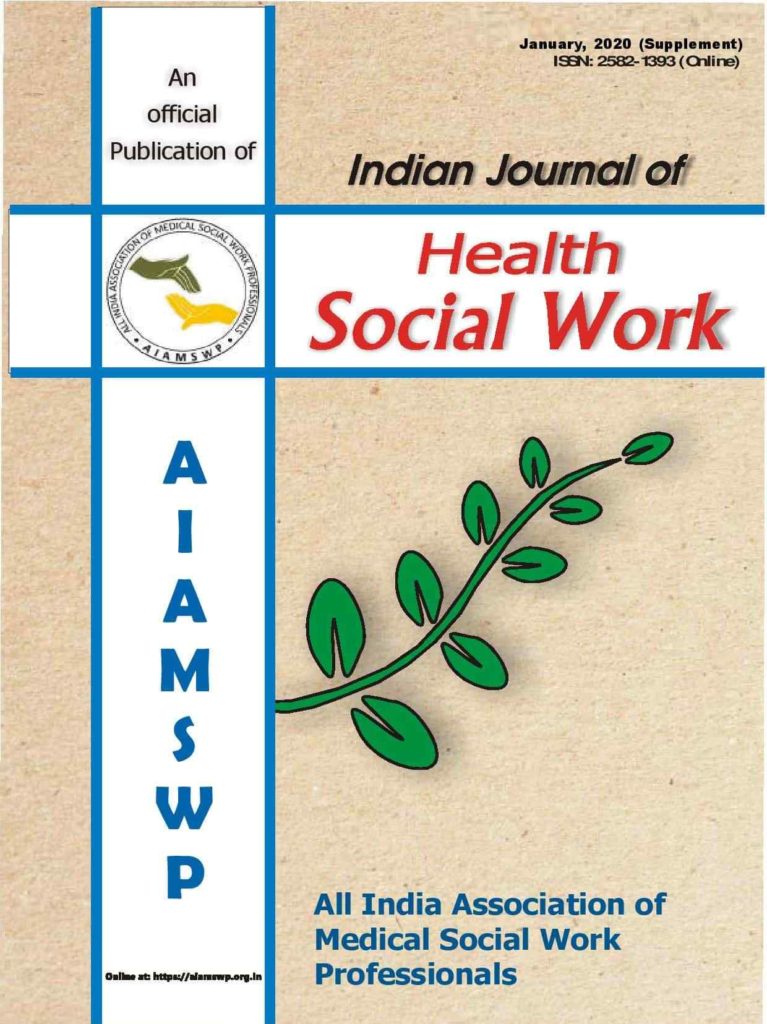Indian Journal of Health Social Work
POLITICAL ECONOMY OF PUBLIC HEALTH AND RESEARCH IN INDIA:IS IT A LACK OF POLITICAL WILL OR A FUNDING ISSUE?
In India there is one government doctor over 10000 patients (as opposed to WHO recommended doctor-patient ratio of 1:1,000) – and one nurse for about 500 patients. As a result, India needs 6,00,000 doctors and 20,00,000 nurses to meet the demands of an efficient public health care,
according to the findings of a US-based Center for Disease Dynamics, Economics & Policy early this year.Even if we entirely depend on doctors n nurses, India will continue to face the burden of health care. So, to curve these issues, it’s time to focus on prevention and rehabilitation with
the contribution of social scientists and social work professionals and further research. In this article, I wish to highlight the need and value of social science, in general, and social workers, in particular, in tackling the challenge of an efficient public health system in the country.
Public Health in India
The need for a publicly financed national health services and system for comprehensive preventative and curative health care for all in India dates back to the recommendation of Bhore committee report in 1946. Hence, a public health agenda, as later set out at Alma-Ata Declaration of 1978, called for developing and strengthening primary health care in India through an integrated approach to epidemiological and demographic transitions, along with environmental changes and socio-economic determinants of health. However, this remains an unfinished agenda with inadequate health coverage and lack of access to quality care, largely due to ‘insufficient public investments and failure to focus on the synergies between the role of the centre and the states’ financing’.
Consequently, rising burden of chronic non-communicable disease like hypertension and diabetes coupled with an increasing elderly population, high levels of maternal and child mortality, HIV/AIDS pandemic, re-emerging TB and malaria and other such communicable diseases continue to pose major challenges for our existing health system and provisions. State of public health and health care in India remains abysmally low. India’s current health expenditure (as percentage of GDP) is just over 1 percent (1.28%), as per the latest National Health Profile data (14th edition) released by Central Bureau of Health Intelligence (CBHI). Inadequate financial resources for the health sector continue to drive and reinforce health inequalities in India. It has been well established that the root causes of health inequalities primarily lie in the socio-historical, economic and political factors of a country (WHO, 2008). Several forms of health inequalities have existed in India since British colonial rule. One of these have been inequities in the availability, utilisation and affordability of health services. After independence, attempts have been made to expand the health services but remained inadequate to ensure universal quality care coverage. To ensure equitable healthcare for all, and in line with meeting the UN Sustainable Development Goals, India has once again officially embarked on the path to UHC since 2010 and have even included it in its 12th five-year plan (2012-17). The recent launch of an ambitious national health protection scheme called Ayushman Bharatis another step towards realising India’s long-standing dream of health for all. It is in this context that public
health in India has gained a new momentum and criticalityfor an ambitious agenda towards universalising healthcare.
- By way of generating a health stakeholder map, through an assessment of political and economic landscape of the health sector
- By focussing on how political strategies shape the possibility of a health policy reform
- Through monitoring and evaluating the progress of implementation vis-à-vis agenda setting
- State of public health and health care in India remains abysmally low. According to the latest available National Health Accounts (NHA), patients in India bear a big chunk of health expensesby themselves, i.e., 61 per cent of the total health expenditure. While the share of government’s health expenditure has increased over the years, it was still low at 31% in 2015-16 (National Health Accounts Estimates for India, 2018).
- India’s current health expenditure (as percentage of GDP) is just over 1 per cent (1.28%), as per the latest National Health Profile data (14th edition) released by Central Bureau of Health Intelligence (CBHI). While it shows a little increase from the 1.02% in the previous years, it is still very low compared to other global economies like US. That is, Indian government spends as little as Rs.3 per day for its every single citizen. Even if it increases to 2.5% by 2025, as promised by the incumbent government at the Centre, it will be well below the minimum expected 5% of the GDP.
- Most crucially, the cost of treatment by patients has been on the rise leading to inequity in access to healthcare services. In short, India’s current public health spending is one of the lowest in the world, even lower than countries like Sri Lanka, Nepal and Bhutan.
- The results of poor financing for public health were evidently reflected in some of the communicable diseases that took toll of Indian lives in 2018, as per the 14th edition National Health Profile data,
- Pneumonia (30%),
- Respiratory infection (27%),
- Acute Diarrhoea (11%), and
- Swine Flu (8%) along with typhoid, hepatitis, encephalitis.
- Hypertension (6.19%),
- Diabetes (4.75%)
- Heart disease (0.30%),
- Strokes (0.10%) and
- Common cancers (0.26%).

It’s a matter of great pride for me that All India Association of Medical Social Work Professionals is launching first issue of “Indian Journal of Health Social Work” on the auspicious occasion of 6th Annual National Conference of AIAMSWP, 2019.

